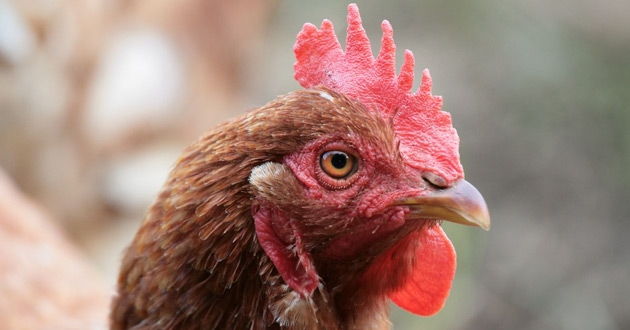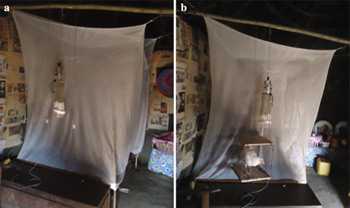Will chicken cologne guard you from malaria?
Mosquitoes that transmit malaria can’t stand the scent of these birds

It this the solution to keeping malaria-carrying mosquitoes out of the home?
Holly Hayes/ Flickr (CC BY-NC 2.0)
Chickens are not known for their courage. But it turns out they can defend people from the mosquitoes that transmit malaria. How? The bloodsuckers find the scent of these fowl too foul to tolerate.
Malaria is a deadly disease. It’s caused by a parasite that lives in blood. Female mosquitoes can carry the parasite and share it when they bite people or other animals. In humans, the parasite can damage the lungs and brain. In 2015, malaria sickened roughly 214 million people. Some 438,000 of them died. Many had lived in sub-Saharan Africa, where the disease is most common.
Mosquitoes that transmit malaria use their sense of smell to find a tasty meal of blood. Their next dinner site may be a cow, goat, sheep — or human. They home in on victims by sniffing out the carbon dioxide they exhale or the body odors they give off.
But these insects have no interest in chickens. In fact, the smell of these birds repels them.
Researchers from the Swedish University of Agricultural Sciences in Uppsala and Ethiopia’s Addis Ababa University made that discovery recently. They described the finding July 21 in the Malaria Journal.
“People say mosquitoes don’t care what they feed on,” says Rickard Ignell. “But we found they actually have ways of discriminating between good and bad blood meals and are using their sense of smell to do that.” Ignell is an ecologist at the Swedish University of Agricultural Sciences. There, he studies how insects give people diseases. His team did field research in three rural villages in Ethiopia.
People living in this part of East Africa share their huts with livestock, especially at night. And mosquitoes in those huts strongly preferred human blood over another animal’s, the new study found. Outdoors, the mosquitoes fed randomly on cattle, goats and sheep. They only rarely dined on people who were outside.
The researchers don’t yet know why the mosquitoes feed on different animals indoors and out. What they do know is that the insects always avoided chickens. And this was surprising, they note, as there were a lot of chickens everywhere.
Concludes Ignell: “The takeaway message is that you can protect yourself by having more chickens around.”
What’s so foul about fowl?
The researchers knew mosquitoes use their sense of smell to find a blood meal. So they decided to test the odors that all of the farm animals emitted. Maybe chickens smelled different from cattle, goats and sheep.
The researchers collected fur, wool and feathers from the various animals. Chemicals in the materials give each type of animal its unique smell. So the scientists analyzed those scent compounds that the animals had been giving off.
Chickens produced four chemicals that none of the others farmyard critters did. The researchers then tested each chemical to see if it could shoo mosquitoes away. To do this, they placed insect traps in 11 huts for a week and a half. Each trap was a plastic cylinder with a fan inside that sucked in any mosquitoes that flew near. The researchers baited different traps with the scent compounds of cattle, goats, sheep or chickens.

Just to make sure mosquitoes would come into the huts, a human volunteer slept in each one. (The person slept under a bed net to stay safe from mosquito bites). The mosquitoes followed the scents of the people and entered the huts. When they couldn’t get through the nets, they began to sniff out a meal elsewhere.
The smelly traps hung right beside the bed nets. In the morning, traps baited with odor chemicals from cattle, sheep and goats all had mosquitoes in them. But those baited with chicken scents caught almost no mosquitoes. Hanging a cage holding a live chicken next to a trap also kept bugs away.
Richard Hopkins is a scientist who studies how insects behave. He works at the University of Greenwich in Kent, England. This study is a great example of what researchers can achieve when they carefully move from one conclusion to another, he says.
The researchers started by figuring out that mosquitoes avoid chickens. Next, they moved on to collecting the odors of the chickens. Then they figured out which compounds in chicken odor were affecting mosquitoes. “Each step is clear and distinct, with a clear question being answered before proceeding to the next,” Hopkins says.
After their discovery, Ignell and his team wondered why mosquitoes avoid chickens in the first place. They still aren’t sure. But it might be because chickens eat mosquitoes. Cattle, sheep, goats — and people — don’t. So the scientists suspect these bugs have learned to flee the smell of their predators. They also think mosquitoes might not find chicken blood as nutritious as the blood of mammals, including us.
Ignell hopes other researchers will now figure out how to use chicken scent to keep mosquitoes away from people. For example, they could put the scent into a wax or plastic that slowly released the odor into the air. Ideally, he’d like somebody to help pay for these special plastics or waxes so poor villagers can afford them.
“Or maybe we’ll discover these odor compounds also exist in certain plants,” says Ignell. Then people could just plant them in the village. They could even hang bouquets of them around their huts for extra protection.







